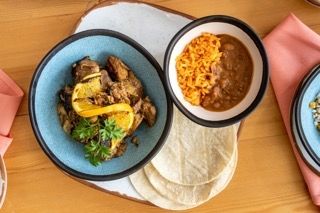Discover the secrets behind tacos with love
Wiki Article
Is Mexican Food Healthy And Balanced? Unboxing the Nutritional Advantages of Conventional Active Ingredients
The question of whether Mexican food is healthy and balanced invites an exploration of its typical components. Beans and corn work as fundamental staples, abundant in healthy protein and fiber. Avocados offer helpful fats, while different natural herbs and seasonings include flavor and wellness benefits - lunch and dinner. With each other, these elements develop a tapestry of nutrition. The healthfulness of Mexican food commonly depends on preparation methods and section sizes. What role do these factors play in establishing its general nutritional worth?The Power of Beans: Healthy Protein and Fiber-Rich Staples
Although usually forgotten, beans offer as a cornerstone of Mexican food, supplying a wealth of nutritional benefits. Rich in healthy protein, they are an outstanding plant-based choice for those seeking to fulfill their nutritional healthy protein needs. This high protein content sustains muscle repair work and development, making beans very useful for both meat-eaters and vegetarians alike. Furthermore, beans are an outstanding resource of dietary fiber, which aids in digestion and promotes a sensation of volume, potentially assisting with weight monitoring.The variety of beans made use of in Mexican dishes, such as black beans, pinto beans, and kidney beans, contributes to a varied taste account and can enhance meals nutritionally. Moreover, beans are reduced in fat and contain necessary minerals and vitamins, consisting of folate, iron, and magnesium. Together, these qualities make beans an important ingredient, delivering both nutrients and nourishment in standard Mexican price.

Corn: a Versatile Grain With Nutritional Benefits
Corn attracts attention as a functional grain essential to Mexican cuisine, celebrated not just for its culinary applications however additionally for its remarkable dietary account. As a key component in meals like tortillas, tamales, and pozole, corn provides important nutrients that contribute to a well balanced diet. Rich in carbohydrates, it serves as a substantial power resource, while also being reduced in fat, making it a desirable option for numerous dietary requirements.Additionally, corn is an excellent source of nutritional fiber, which assists in digestion and advertises satiety. It includes substantial amounts of vitamins such as B-complex vitamins, which are essential for basal metabolism. The visibility of antioxidants, specifically carotenoids, adds to general wellness by decreasing oxidative tension. In addition, corn is gluten-free, satisfying those with gluten sensitivities. Generally, the dietary advantages of corn emphasize its significance in conventional Mexican food and its role in a healthy and balanced diet plan.
Avocados: Healthy Fats and Nutrients in Every Bite
Avocados play a considerable function in Mexican cuisine, matching meals with their luscious structure and abundant flavor. Beyond their culinary allure, avocados are celebrated for their remarkable dietary account. They are an abundant resource of healthy monounsaturated fats, which can assist lower negative cholesterol levels and support heart wellness. Furthermore, avocados are loaded with important minerals and vitamins, including potassium, vitamin E, and B vitamins, adding to general health.The high fiber content in avocados aids food digestion and advertises satiation, making them an advantageous addition to any dish. Their distinct nutrient structure can also sustain skin wellness and offer anti-inflammatory benefits. Integrating avocados into conventional Mexican recipes or enjoying them as a standalone snack can improve both flavor and nutrition, demonstrating why they are a precious staple in Mexican food. In general, avocados supply a tasty method to enjoy healthy and balanced fats and vital nutrients in every bite.

Herbs and flavors: Flavorful Health Boosters
While delighting in the rich tastes of Mexican cuisine, one can not ignore the vital role that spices and natural herbs play in enhancing both taste and health and wellness. Components such as oregano, cilantro, and chili peppers not just add to the vibrant taste account yet also supply significant health benefits. As an example, cilantro is understood for its detoxifying residential or commercial properties, assisting to remove hefty metals from the body, while oregano is packed with antioxidants and possesses anti-inflammatory results.Chili peppers, a staple in many Mexican meals, have capsaicin, which has been linked to boosted metabolic rate and discomfort alleviation. In addition, flavors like cumin and coriander assistance digestion and may assist in blood sugar law. Incorporating these savory health boosters right into meals not just improves the cooking experience however likewise advertises overall well-being, making Mexican cuisine not simply scrumptious, but additionally nutritionally advantageous.
Typical Cooking Methods: Enhancing Nutrition and Flavor
Conventional food preparation techniques in Mexican cuisine play an important function in improving both nourishment and flavor, as they commonly prioritize classic strategies and fresh ingredients. Strategies such as nixtamalization, where corn is soaked and cooked in an alkaline option, not only improve the nutrient profile of tortillas however also improve their digestibility - happy hour. Additionally, the usage of sluggish food preparation methods, like stewing or braising, permits tastes to blend wonderfully while preserving the integrity of the componentsRegularly Asked Concerns
Are Mexican Food Portions Usually Larger Than Other Cuisines?
Mexican food portions are commonly larger than those of lots of other cuisines. This particular reflects traditional eating practices, highlighting common sharing and hearty meals, which can cause a more considerable offering dimension overall.
Exactly how Does the Preparation Approach Affect Healthiness of Mexican Food?
Preparation techniques significantly influence the healthiness of Mexican food. Techniques such as cooking or steaming preserve nutrients, while frying can raise unhealthy fat web content. Selections of components and cooking designs eventually determine general dietary value.Can Mexican Food Be Tailored for Details Nutritional Restrictions?
Mexican food can certainly be customized for certain nutritional limitations. Alternatives, such as utilizing corn tortillas for gluten-free diet regimens or integrating even more vegetables, enable people to enjoy traditional tastes while fitting freshly made guacamole various nutritional needs.What Prevail Misunderstandings Concerning Mexican Food and Health?
Usual misunderstandings concerning Mexican food include the belief that it is naturally unhealthy, excessively hot, and solely concentrated on fats. In reality, typical meals typically include nourishing components and can be tailored to numerous nutritional needs.Are There Healthier Options at Mexican Restaurants?
Healthier alternatives at Mexican dining establishments usually consist of barbequed meats, beans, and fresh vegetables. Choosing dishes that emphasize entire active ingredients and preventing heavy sauces can lead to an extra nourishing dining experience, promoting total health.The range of beans utilized in Mexican dishes, such as black beans, pinto beans, and kidney beans, adds to a varied flavor account and can improve meals nutritionally. Avocados play a significant duty in Mexican cuisine, complementing dishes with their velvety texture and abundant taste. Including avocados right into traditional Mexican recipes or enjoying them as a standalone treat can boost both taste and nutrition, showing why they are a precious staple in Mexican cuisine. While delighting in the abundant tastes of Mexican cuisine, one can not ignore the important duty that spices and herbs play in boosting both taste and health and wellness. Traditional food preparation techniques in Mexican food play a vital role in improving both nutrition and flavor, as they often focus on time-honored strategies and fresh components.
Report this wiki page